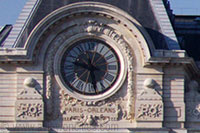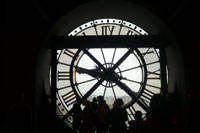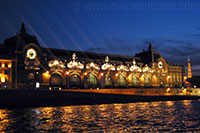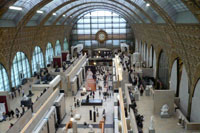The Musée d'Orsay is a museum housed in a grand
railway station built in 1900. Home to many sculptures and impressionist
paintings, it has become one of Paris's most popular museums.

New Railway Stations
At the turn of the 19th century, two large railway stations
were built in Paris, the Gare de Lyon and the Gare d'Orsay. The Gare d'Orsay
had the most prominent site, along the Seine opposite the Louvre.
The railway station was planned by the Compagnie d'Orléans, who wanted to bring
electrified trains right into the heart of Paris.
Design
The architect first appointed was Eugène Hénard. He intended to use industrial material
on the facade facing the Louvre. Facing fierce protests from preservationists,
the


 Compagnie d'Orléans decided to hold a competition supervised by a parliamentary
commission. The winner of this contest was Victor Laloux, who had also designed the
railway station in Tours, France.
Compagnie d'Orléans decided to hold a competition supervised by a parliamentary
commission. The winner of this contest was Victor Laloux, who had also designed the
railway station in Tours, France.
His design was acclaimed for the integration of the metal vault in the stone exterior. The hall measures 140 meter long, 40 meter wide and 32 meter high (459 x 132 x 105 ft). The whole structure is 175 meter long and 75 meter wide (574 x 246 ft). An impressive 12 000 ton metal was used for the construction of the gare d'Orsay, which is well more than the amount of metal used for the Eiffel Tower.

One of the Station's giant clocks

A clock seen from inside

The museum at night
His design was acclaimed for the integration of the metal vault in the stone exterior. The hall measures 140 meter long, 40 meter wide and 32 meter high (459 x 132 x 105 ft). The whole structure is 175 meter long and 75 meter wide (574 x 246 ft). An impressive 12 000 ton metal was used for the construction of the gare d'Orsay, which is well more than the amount of metal used for the Eiffel Tower.
The Railway Station...
The Gare d'Orsay was inaugurated on the 14th of July 1900 for the Paris World Exposition
and was considered a masterpiece of industrial architecture. But soon the platforms
had become too short for the now much longer trains and as early as 1939, the
gare d'Orsay was out of use as a train station. Over time it was used as a parking
lot, as a shooting stand, as a theatre location and even as a reception center
for prisoners of war.
...Turned into a Museum
The train station had been completely abandoned since 1961 when it was saved from
demolition by the French president Pompidou. In 1978 his successor, president Giscard d'Estaing,
decided to use the Gare
 d'Orsay as a museum for 19th and 20th century art.
d'Orsay as a museum for 19th and 20th century art.
It would not only contain paintings, but it would also cover different art forms, including sculptures, engravings, photos, film, architecture and urbanism.
Restoration of the Musée d'Orsay, as it is now called, started in 1979 and finally on the 29th of November 1986, the museum was inaugurated by the French president, François Mitterrand.

Inside the museum
It would not only contain paintings, but it would also cover different art forms, including sculptures, engravings, photos, film, architecture and urbanism.
Restoration of the Musée d'Orsay, as it is now called, started in 1979 and finally on the 29th of November 1986, the museum was inaugurated by the French president, François Mitterrand.
Collection
When it opened the museum contained some 2300
paintings, 1500 sculptures and 1000 other objects.
Most of these works of art came from other museums such as the Musée
du Luxembourg. Over time the collection has expanded significantly
mainly due to acquisitions and gifts. It covers a period from the mid
19th century up to 1914 and contains
works from Degas, Rodin, Monet, Manet, Renoir, Cezanne, van Gogh and
others.
No comments:
Post a Comment